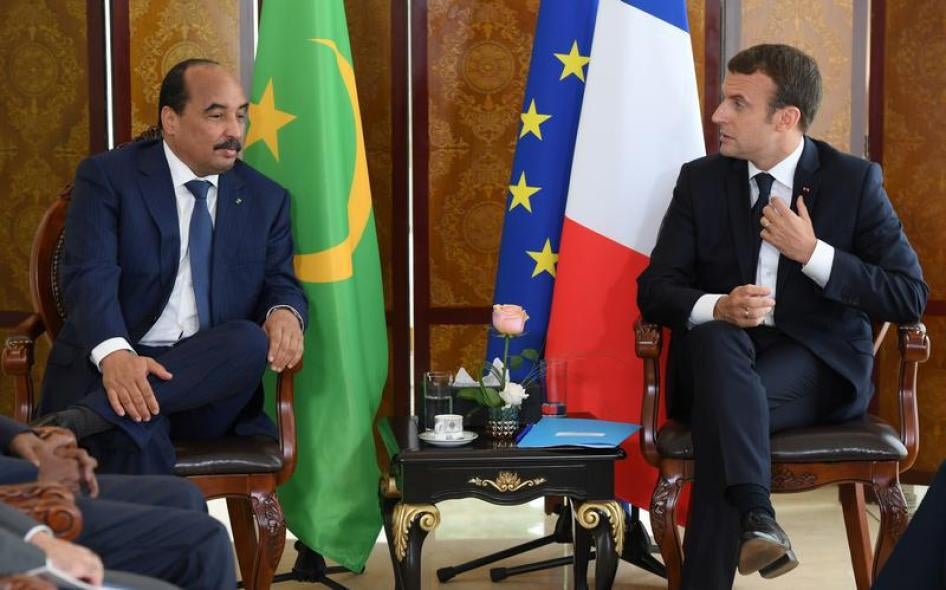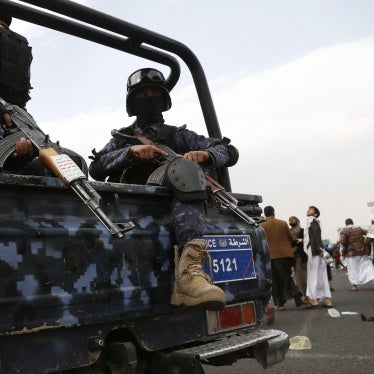On July 2 and 3, Emmanuel Macron will travel to Mauritania for the African Union summit, followed by an official visit. This is the first time since 1997 that a French president will visit this country in the Sahel. With the Mauritanian presidential election just a year away, there is little doubt that the ruling party will capitalize politically on this visit. So why not take advantage of this trip to demonstrate, in a concrete way, France's commitment to freedom of expression and rejection of the death penalty?
Discussions between the French president and his Mauritanian counterpart, General Mohamed Ould Abdel Aziz, will probably mostly focus on the fight against terrorism in the Sahel, a top priority for Macron. In the past, the Mauritanian president has praised Macron's "pragmatism," but it is essential that Macron does not forget the principles and values, including those relating to human rights, that he claims underpin French diplomacy. During his first official visit to West Africa in November 2017, Macron had wanted to lay the foundations of a new dialogue with his African counterparts and proposed "inventing a friendship to act," reminding them that "the bond of friendship means telling each other everything from the start."
Under Abdel Aziz, Mauritania has set itself up as the guarantor of the fight against the growing terrorist threat in the Sahel region, while adopting restrictive laws with excessively vague definitions of terrorist offenses, allowing the authorities to muzzle opponents and activists whose rhetoric is not to the government's liking. The anti-terrorist law adopted in 2010 led to Abdallahi Salem Ould Yali, an activist from the Haratine community — Arab-speaking, dark-skinned Mauritanians who are descendants of enslaved people — being charged with incitement to ethnic or racial fanaticism — a form of behavior that constitutes a "terrorist offense." His "crime" was to have sent audio-messages in a WhatsApp group denouncing discrimination against his ethnic group and calling on its members to stand up for their rights. Yali has been in detention since January 24.
The same charge has been leveled at Oumar Ould Beibacar, a retired colonel of the National Guard, who had the courage to denounce the summary execution of his fellow officers in 1992 in a purge of black army officers and to demand that the Mauritanian government account for these crimes that the authorities would rather ignore. Following his statements in 2015, the authorities placed Beibacar under judicial control and confiscated his passport. Three years on, the justice system has refused to take a decision on his case or to close it.
In a recent interview with Jeune Afrique, President Aziz stated that "all freedoms are guaranteed in Mauritania. We don't have a single political prisoner." Apart from Abdellahi Yali, two anti-slavery activists are currently serving a two year prison sentence in Bir Moghrein prison, on the edge of the desert, following an unfair trial.
The most revealing case remains that of Mohamed Cheikh Ould Mkhaitir, a Mauritanian blogger arrested in January 2014 and sentenced to death for apostasy after publishing an online article questioning the use of religion by some of his compatriots to legitimize caste discrimination. The irony is striking: Here is a State that claims to stand as a fortress against religious extremism and its diktats, but whose courts impose the death penalty for a speech offense deemed offensive to the state religion.
Last November, the Nouadhibou Court of Appeals commuted Mkhaitir's sentence to two years in prison, making him eligible for immediate release. However, he remains detained in an unknown location, without any valid legal ground. Only external pressure seems likely to alter the course of events for this young man. The French president should therefore appeal to the Mauritanian president to release Mkhaitir as soon as possible, in compliance with Mauritanian and international law.
Macron should also question his counterpart on the hardening of laws on freedom of expression and association in Mauritania. In April, the National Assembly passed a law that makes the death penalty mandatory for any Muslim found guilty of apostasy or blasphemy, with no possibility of filing a plea for clemency if the defendant repents. This law violates numerous international law guarantees protecting freedom of expression, the right to a fair trial, and the right to life. Experts from the United Nations and the African Commission on Human and Peoples' Rights have urged parliamentarians to reconsider the law, which President Abdel Aziz has justified as a demand from "the street".
The difficulties raised by cooperating with repressive governments in the fight against terrorism are not new. But how can it be productive in the long term if the partner State uses its anti-terrorism tools to repress peaceful demonstrations and punish apostasy and blasphemy with the death penalty? Macron should not miss the opportunity of his meeting with his Mauritanian counterpart to state clearly that in order to be effective, the fight against terrorism cannot involve suppressing fundamental rights and silencing all critical voices.









